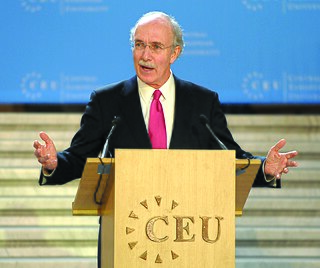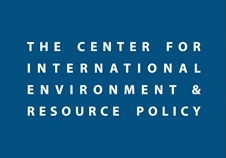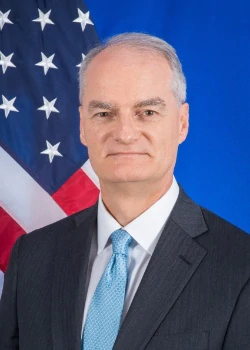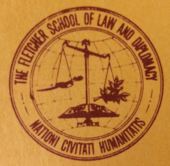
The Edmund A. Walsh School of Foreign Service (SFS) is the school of international relations at Georgetown University in Washington, D.C. It grants degrees at both undergraduate and graduate levels.

John Howard Francis Shattuck is an international legal scholar and human rights leader. He served as the fourth President and Rector of Central European University (CEU) from August 2009 until July 31, 2016. He is a senior fellow at the Harvard Kennedy School, and he joined the faculty of Fletcher School of Law and Diplomacy in January 2017.

The School of Advanced International Studies (SAIS) is a graduate school of Johns Hopkins University based in Washington, D.C. The school also maintains campuses in Bologna, Italy and Nanjing, China.

The School of International Service (SIS) is American University's school of advanced international study, covering areas such as international politics, international communication, international development, international economics, peace and conflict resolution, international law and human rights, global environmental politics, and U.S. foreign policy.

Moscow State Institute of International Relations (MGIMO) is an institute of higher education located in Moscow, Russia. The institute is run by the Russian Ministry of Foreign Affairs.

The Lyndon B. Johnson School of Public Affairs is a graduate school at the University of Texas at Austin that was founded in 1970. The school offers training in public policy analysis and administration in government and public affairs-related areas of the private and nonprofit sectors. Degree programs include a Master of Public Affairs (MPAff), a mid-career MPAff sequence, 16 MPAff dual degree programs, a Master of Global Policy Studies (MGPS), eight MGPS dual degree programs, an Executive Master of Public Leadership, and a Ph.D. in public policy.
A Master in International Affairs (MIA), Master in Global Affairs (MGA), Master of Arts in International Relations (MAIR), Master of International Policy and Practice (MIPP), or Master of Science in Foreign Service (MSFS) is a professional master's degree in international affairs.

The Elliott School of International Affairs is the professional school of international relations, foreign policy, and international development of the George Washington University, in Washington, D.C. It is highly ranked in international affairs and is the largest school of international relations in the United States.
The SAIS Europe, located in Bologna, Italy, is the European campus of the School of Advanced International Studies (SAIS) under Johns Hopkins University. SAIS Europe's degree programs emphasize international economics, international relations, European Union policy, and global risk with options to specialize in a broad range of other policy areas and geographic regions.

The Robert and Renée Belfer Center for Science and International Affairs, also known as the Belfer Center, is a research center located at the Harvard Kennedy School at Harvard University in Cambridge, Massachusetts, in the United States.

Dubrovnik International University (DIU) (DIU Libertas, or DIU Libertas International University) is a private university established in 2008 under the auspices of the United Nations Alliance of Civilizations and in conjunction with both Croatian and American institutions. It is located within the Dominican Monastery in Dubrovnik, Croatia and is the first private university in the Republic of Croatia. DIU maintains three schools: the Dubrovnik School of Diplomacy, the Dubrovnik School of International Business and the Dubrovnik School of Arts and Humanities. Classes are taught primarily in English, which facilitates the enrollment of both Croatian and foreign students.

Institute for Business in the Global Context(IBGC) is an educational organization founded in 2011, devoted to international business studies, within The Fletcher School of Law and Diplomacy, at Tufts University. IBGC houses the school's Master of International Business (MIB), and the Council on Emerging Market Enterprises (CEME).

Alan Michael Wachman was a scholar of East Asian politics and international relations, specializing in cross-strait relations and Sino-U.S. relations. He was a professor of international politics at The Fletcher School of Law and Diplomacy, Tufts University. Previously he had been the co-director of the Johns Hopkins University-Nanjing University Center for Chinese and American Studies in the PRC, and the president of China Institute in America.
The Feinstein International Center (FIC) is a research and teaching center based at the Friedman School of Nutrition Science and Policy at Tufts University. The Center promotes the use of evidence and learning in operational and policy responses to protect and strengthen the lives, livelihoods, and dignity of people affected by humanitarian crises.
The Fletcher School's International Security Studies Program is a center for the study of international security studies and security policy development. It was established in 1971 at The Fletcher School of Law and Diplomacy, Tufts University. ISSP conducts its academic activity through courses, simulations, conferences, and research. It also has a military fellows program for midcareer U.S. officers.
The Frederick S. Pardee School of Global Studies is the international relations and public policy school of Boston University. It was officially established in 2014 by consolidating and renaming a number of long-established programs in international and regional studies at Boston University dating back to 1953. The current dean of the Pardee School is Scott D. Taylor, an American scholar of African politics and political economy, with a particular focus on business-state relations, private sector development, governance, and political and economic reform. The Pardee School has nearly 1,000 students, including about 800 undergraduate students. It offers six graduate degrees, two graduate certificates, five undergraduate majors, and seven undergraduate minors, and also brings together seven centers and programs of regional and thematic studies.

The Fares Center for Eastern Mediterranean Studies is an interdisciplinary education and research organization founded in 2001, devoted to the regional study of the Eastern Mediterranean within the greater Middle East. The Center is part of The Fletcher School of Law and Diplomacy, at Tufts University. Its aim is the study and understanding the heritage of the Eastern Mediterranean and the challenges it faces in the twenty-first century, being at the crossroads between the academic and policy world.

The Center for International Environment and Resource Policy (CIERP) is an interdisciplinary education and research organization founded in 1992, devoted to the study of international sustainable development, within The Fletcher School of Law and Diplomacy, at Tufts University.
The Henry J. Leir Institute for Migration and Human Security, founded in 2001, is an interdisciplinary education and research organization within The Fletcher School of Law and Diplomacy, at Tufts University. The Leir Institute's mission is to help policymakers and practitioners develop more equitable and sustainable responses to migration and its root causes by employing a human security approach. Leir's research and education also intersect with humanitarianism, development, human rights, and conflict resolution, and the Institute is recognized as a leading academic institution in its field.

Hugh Dugan is an American academic and diplomat who served as the acting Special Presidential Envoy for Hostage Affairs from October 4, 2019 to March 1, 2020.






















